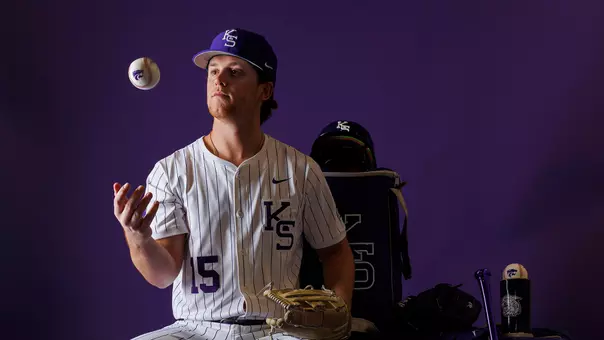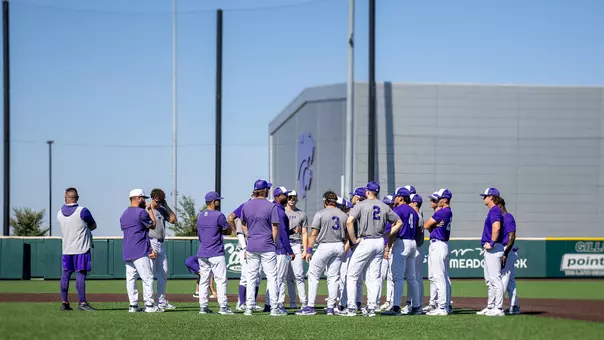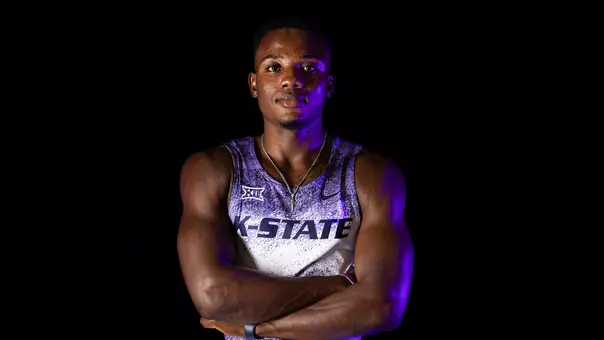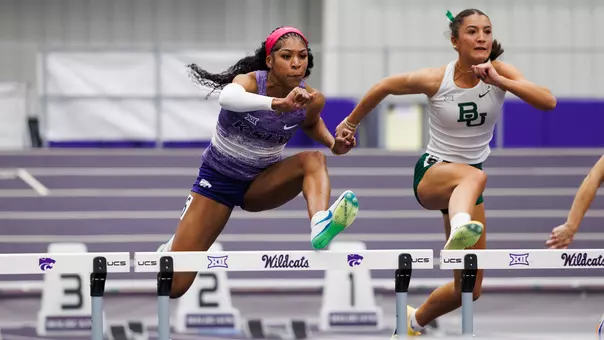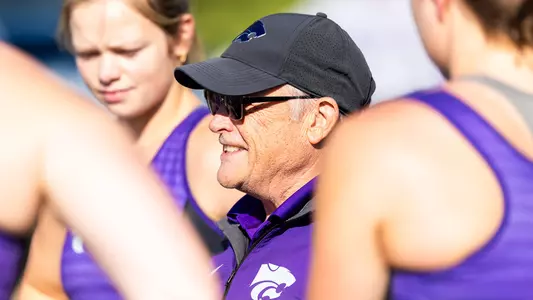
Overseeing 22 Years of Growth
May 29, 2025 | Rowing, Sports Extra
By: D. Scott Fritchen
After 22 years, Patrick Sweeney recently announced his retirement as head coach of the Kansas State women's rowing team. Sweeney, a native of London, England, arrived at K-State prior to the 2003-04 season and enhanced a women's rowing program that eventually finished runner-up in the 2014 Big 12 Championship and captured five gold medals and a bronze medal at the SIRA Championship for the first time in history.
It's been a steady process.
"It's been the growth of the team from where it started from when the program wasn't great and building it to the point where it was competitive in the NCAAs and the way we've done it," Sweeney says. "We've built the program on American kids, local kids, teaching them from scratch."
After 22 years, Sweeney passes the proverbial torch to Manhattan native Kennedy Felice, who will serve as head coach after five seasons as one of Sweeney's assistant coaches. She was a four-year member of the rowing team before becoming a graduate assistant and eventually an assistant coach.
Sweeney will stay on temporarily in an advisory role to assist Felice in the coaching transition.
K-State Sports Extra's D. Scott Fritchen spoke with Patrick Sweeney about his life, his 22 years at K-State, and his thought on how the landscape of women's rowing has changed over the past two decades.
D. Scott Fritchen: Now that you've had a little bit of time to reflect, how would you describe the Pat Sweeney era of K-State rowing and all the successes that went along with it?
Patrick Sweeney: It's been the growth of the team from where it started from when the program wasn't great and building it to the point where it was competitive in the NCAAs and the way we've done it. We've built the program on American kids, local kids, teaching them from scratch. It's pretty competitive, and I'm really proud of where the program has moved to. We know what we're going to do and how we're going to run it, and it's gotten to the point where it's competitive, and we can have good races. To me, collegiate sports isn't all about winning. Collegiate sports are about education and making well-rounded people at the end of it. Sports is supposed to be about building character more than anything else.
Fritchen: What has the response been since the announcement of your retirement?
Sweeney: I've received really nice texts and e-mails from past kids — they're not kids anymore — and people and parents. The response has been really sort of humbling. It's like thank you — they're the ones that did all the work. I was just trying to guide them. It's been really nice, the response I've gotten, and am receiving.
Fritchen: Have you thought at all about the fact that here you are, you've poured your heart into the sport at K-State for 22 years, and for the first time you'll be watching it all on the sideline? What might that feel like?
Sweeney: I'll have to let you know when I'm doing it. I'm not that concerned about it because before I came here, I did 26 years in Europe on the international level, and this retirement is under my terms, and I feel really good about it. I'm really not that concerned about standing on the sidelines. I'll be an interested observer. At the same time, I'm going to be somewhat involved still in the program in an advisory capacity and in helping with the transition, because the way this program is run is different than going out and buying 20 foreign kids and that sort of stuff. This is a teaching project, and I love that. I'm still going to be involved at some level.

Fritchen: To back up, you came to K-State after one year at Stanford as associate men's varsity coach and after seven years on the Belgian Olympic Team. How did you learn about the K-State rowing job and what intrigued you about it?
Sweeney: I was in Europe coaching national teams in Britain, plus I did a little bit of time with the Canadians, a couple years on their international team, and then I coached at Cal-Berkeley for six years. Then the Brits asked me there, so I went back to the international circuit again with the Brits, and then with Belgium, and then my wife and I decided, because we had a daughter, to come back to the States. I wanted to get out of international coaching because you can't have a life. You're on the road six months out of the year, basically. I always enjoyed coaching and teaching, so we went back to the States to see what was open there. I had a good friend at Stanford and said I needed to get back to the collegiate scene, and he said to come and work for me for a year to get your face back in U.S. college rowing. So, it was just getting my foot back into the door. Coming to K-State, what I was really looking for was a program that would challenge me and needed to be built. I received a couple offers from established programs and I didn't want to do that. I was looking for a program that was a challenge and saw the offer from K-State and it was the perfect fit. Luckily, K-State said, "We want you." That's really how it came about.
Fritchen: How have you seen the landscape of women's rowing on a national level change in the last 22 years? What have been some of the biggest changes to the sport?
Sweeney: What's unfortunate is schools — we just finished the Big 12s, and in the NCAA there are 20 rowers, the two 8s and the 4, and if you look at UCF, which won the Big 12s, and out of those 20 rowers, only six of them were American kids and 14 were international kids. Texas, Tennessee, Tulsa, all of these schools are the same. And this is what's happening, and I think it's totally wrong. This is the biggest change I've seen in 20-plus years. It's getting ridiculous. A lot of American women aren't getting the opportunity that we're giving to women. I'm an American citizen now, but I'm foreigner. The Brits wouldn't do this. No other teams would take in so many foreigners to teach them to beat you. You look at the American women, and they can't win a bloody Olympic medal at the moment, because they're teaching foreign kids how to beat them. It's crazy.
Fritchen: Kennedy Felice now steps in as K-State head coach. She's gone from graduate assistant to assistant coach to head coach. Walk me through Kennedy's path and what you appreciate most about her as a person, recruiter, teacher and as a coach?
Sweeney: Firstly, we do things a lot different than a lot of programs. We teach and do it the way it used to be done decades ago, which is teaching Americans how to row. The good thing about Kennedy is she has come through the system, and she understands the recruiting of local kids who've never done it before, and she's learned how to teach someone from zero how to row, and she understands how to recruit them and teach them and the next step for her is how to run a complete program. I trust her and think she is going to do a great job.

Fritchen: Take me back to that very first moment that you became interested in rowing. Do you remember it? What made you interested in the sport?
Sweeney: I got to go back to when I was 12 years old. I was in a sports school in London, and we played all different sports. I thought I was going to be a great soccer player, and then when I got there, I found out I wasn't going to be a great soccer player. So, I tried other sports and one of them was rugby in the winter, and then all my friends grew bigger, and I didn't, and they all did a sport called rowing in the summer. One of the positions was to be a coxswain, and you had to be a small guy to be a coxswain. So, my big friends dragged me to rowing, and I started doing it, and I found out I could push these big guys around by sitting in the boat and telling them what to do. It seemed to come very naturally to me to tell people what to do. That was it. I was hooked.
Fritchen: What are some of your most memorable memories as you broke into rowing and what did you learn along the way?
Sweeney: I can't say there's any one thing. I've been in the right place at the right time, so therefore I've had some good success in my time. I've just been lucky. I can't pick out one thing. It's been good.
Fritchen: Big picture, what are some things you are proudest of either as a rower or as a rowing coach between 1976 and 2025?
Sweeney: It's the people you meet along the way and the friendships and just appreciating people and working together. Everybody is different. It's about learning to deal with ups and downs and putting the jigsaws of life together.
Fritchen: What have you learned most about yourself during your journey?
Sweeney: Don't take life too seriously. Have fun. Just enjoy it. You're only here once. Appreciate people more. Everybody is trying to do the best they can, hopefully.
After 22 years, Patrick Sweeney recently announced his retirement as head coach of the Kansas State women's rowing team. Sweeney, a native of London, England, arrived at K-State prior to the 2003-04 season and enhanced a women's rowing program that eventually finished runner-up in the 2014 Big 12 Championship and captured five gold medals and a bronze medal at the SIRA Championship for the first time in history.
It's been a steady process.
"It's been the growth of the team from where it started from when the program wasn't great and building it to the point where it was competitive in the NCAAs and the way we've done it," Sweeney says. "We've built the program on American kids, local kids, teaching them from scratch."
After 22 years, Sweeney passes the proverbial torch to Manhattan native Kennedy Felice, who will serve as head coach after five seasons as one of Sweeney's assistant coaches. She was a four-year member of the rowing team before becoming a graduate assistant and eventually an assistant coach.
Sweeney will stay on temporarily in an advisory role to assist Felice in the coaching transition.
K-State Sports Extra's D. Scott Fritchen spoke with Patrick Sweeney about his life, his 22 years at K-State, and his thought on how the landscape of women's rowing has changed over the past two decades.
D. Scott Fritchen: Now that you've had a little bit of time to reflect, how would you describe the Pat Sweeney era of K-State rowing and all the successes that went along with it?
Patrick Sweeney: It's been the growth of the team from where it started from when the program wasn't great and building it to the point where it was competitive in the NCAAs and the way we've done it. We've built the program on American kids, local kids, teaching them from scratch. It's pretty competitive, and I'm really proud of where the program has moved to. We know what we're going to do and how we're going to run it, and it's gotten to the point where it's competitive, and we can have good races. To me, collegiate sports isn't all about winning. Collegiate sports are about education and making well-rounded people at the end of it. Sports is supposed to be about building character more than anything else.
Fritchen: What has the response been since the announcement of your retirement?
Sweeney: I've received really nice texts and e-mails from past kids — they're not kids anymore — and people and parents. The response has been really sort of humbling. It's like thank you — they're the ones that did all the work. I was just trying to guide them. It's been really nice, the response I've gotten, and am receiving.
Fritchen: Have you thought at all about the fact that here you are, you've poured your heart into the sport at K-State for 22 years, and for the first time you'll be watching it all on the sideline? What might that feel like?
Sweeney: I'll have to let you know when I'm doing it. I'm not that concerned about it because before I came here, I did 26 years in Europe on the international level, and this retirement is under my terms, and I feel really good about it. I'm really not that concerned about standing on the sidelines. I'll be an interested observer. At the same time, I'm going to be somewhat involved still in the program in an advisory capacity and in helping with the transition, because the way this program is run is different than going out and buying 20 foreign kids and that sort of stuff. This is a teaching project, and I love that. I'm still going to be involved at some level.

Fritchen: To back up, you came to K-State after one year at Stanford as associate men's varsity coach and after seven years on the Belgian Olympic Team. How did you learn about the K-State rowing job and what intrigued you about it?
Sweeney: I was in Europe coaching national teams in Britain, plus I did a little bit of time with the Canadians, a couple years on their international team, and then I coached at Cal-Berkeley for six years. Then the Brits asked me there, so I went back to the international circuit again with the Brits, and then with Belgium, and then my wife and I decided, because we had a daughter, to come back to the States. I wanted to get out of international coaching because you can't have a life. You're on the road six months out of the year, basically. I always enjoyed coaching and teaching, so we went back to the States to see what was open there. I had a good friend at Stanford and said I needed to get back to the collegiate scene, and he said to come and work for me for a year to get your face back in U.S. college rowing. So, it was just getting my foot back into the door. Coming to K-State, what I was really looking for was a program that would challenge me and needed to be built. I received a couple offers from established programs and I didn't want to do that. I was looking for a program that was a challenge and saw the offer from K-State and it was the perfect fit. Luckily, K-State said, "We want you." That's really how it came about.
Fritchen: How have you seen the landscape of women's rowing on a national level change in the last 22 years? What have been some of the biggest changes to the sport?
Sweeney: What's unfortunate is schools — we just finished the Big 12s, and in the NCAA there are 20 rowers, the two 8s and the 4, and if you look at UCF, which won the Big 12s, and out of those 20 rowers, only six of them were American kids and 14 were international kids. Texas, Tennessee, Tulsa, all of these schools are the same. And this is what's happening, and I think it's totally wrong. This is the biggest change I've seen in 20-plus years. It's getting ridiculous. A lot of American women aren't getting the opportunity that we're giving to women. I'm an American citizen now, but I'm foreigner. The Brits wouldn't do this. No other teams would take in so many foreigners to teach them to beat you. You look at the American women, and they can't win a bloody Olympic medal at the moment, because they're teaching foreign kids how to beat them. It's crazy.
Fritchen: Kennedy Felice now steps in as K-State head coach. She's gone from graduate assistant to assistant coach to head coach. Walk me through Kennedy's path and what you appreciate most about her as a person, recruiter, teacher and as a coach?
Sweeney: Firstly, we do things a lot different than a lot of programs. We teach and do it the way it used to be done decades ago, which is teaching Americans how to row. The good thing about Kennedy is she has come through the system, and she understands the recruiting of local kids who've never done it before, and she's learned how to teach someone from zero how to row, and she understands how to recruit them and teach them and the next step for her is how to run a complete program. I trust her and think she is going to do a great job.

Fritchen: Take me back to that very first moment that you became interested in rowing. Do you remember it? What made you interested in the sport?
Sweeney: I got to go back to when I was 12 years old. I was in a sports school in London, and we played all different sports. I thought I was going to be a great soccer player, and then when I got there, I found out I wasn't going to be a great soccer player. So, I tried other sports and one of them was rugby in the winter, and then all my friends grew bigger, and I didn't, and they all did a sport called rowing in the summer. One of the positions was to be a coxswain, and you had to be a small guy to be a coxswain. So, my big friends dragged me to rowing, and I started doing it, and I found out I could push these big guys around by sitting in the boat and telling them what to do. It seemed to come very naturally to me to tell people what to do. That was it. I was hooked.
Fritchen: What are some of your most memorable memories as you broke into rowing and what did you learn along the way?
Sweeney: I can't say there's any one thing. I've been in the right place at the right time, so therefore I've had some good success in my time. I've just been lucky. I can't pick out one thing. It's been good.
Fritchen: Big picture, what are some things you are proudest of either as a rower or as a rowing coach between 1976 and 2025?
Sweeney: It's the people you meet along the way and the friendships and just appreciating people and working together. Everybody is different. It's about learning to deal with ups and downs and putting the jigsaws of life together.
Fritchen: What have you learned most about yourself during your journey?
Sweeney: Don't take life too seriously. Have fun. Just enjoy it. You're only here once. Appreciate people more. Everybody is trying to do the best they can, hopefully.
K-State Women's Basketball | Coach Mittie Press Conference vs BYU
Sunday, February 08
K-State Women's Basketball | Press Conference vs BYU
Sunday, February 08
K-State Women's Basketball | Game Highlights vs BYU
Sunday, February 08
K-State Men's Basketball | Postgame Press Conference at TCU
Saturday, February 07
